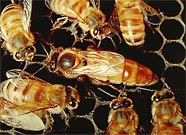Africanized Honey Bee
Africanized Honey Bee (Apis mellifera scutellata)
Regulatory Status: Hawaii Injurious Wildlife (HAR 124)
Prevention and Control Category: None
Not known to be established in Hawai’i
Report this Species!

Description
Also known as the “killer bee” in the mainland U.S., the Africanized honey bee (AHB), Apis mellifera scutellata, looks just like the domestic honey bee. Originally from Africa, the AHB was introduced into Brazil, South America in 1956. It escaped the following year and has been migrating north since then. In 1990, the AHB entered Texas and today it is well-established in the southern portions of Texas, Arizona, New Mexico and California, where it entered in 1994. Today, it occupies most of southern California. Unlike the domesticated European honey bee, the AHB is a “wild” bee that is not comfortable around people or animals, and will readily defend its hive at greater distances from the disturbance, become more upset with less reason, and sting in much greater numbers. Some individuals have been stung hundreds of times in only a few moments. In isolated instances, people and animals have been stung to death, primarily by not being able to get away from the bees quickly enough.
Impacts
The AHB is primarily a public safety threat, especially in Hawaii where our yearround mild climate is sure to favor the development of many hives throughout our lowlands where our residential communities and tourist areas are found. If it were to become established and be difficult to control, it could seriously impact Hawaii’s communities, businesses, and tourism. AHB could also impact commercial beekeepers, resulting in reduced yields to melon and other crops that rely on pollination. It could also impact honey and queen bee production in the State by infiltrating domestic honey bee colonies.
Distribution
Not know to occur in Hawaii. Report highly aggressive bees to HDOA and call the invasive species reporting hotline at 643-PEST.
Relevant HISC-Funded Projects:
Fiscal Year 2012
- EARLY DETECTION OF AFRICANIZED HONEYBEES AND EXOTIC HONEYBEE SPECIES (Hawaii Department of Agriculture, $14,443)
- Hawaii is the largest exporter of European honeybee queens in the world, an industry that is worth $13 million to the local economy. These queens pollinate a range of crops whose value is in the billions of dollars. Africanized and Asian honeybees pose a serious threat to not just beekeeping in Hawaii but also to human health. This funding will provide proactive services including: the development of early detection systems, creating training and awareness programs for beekeepers, inspection personnel of various agencies, and shipping companies.
- Final Report
- Figures
